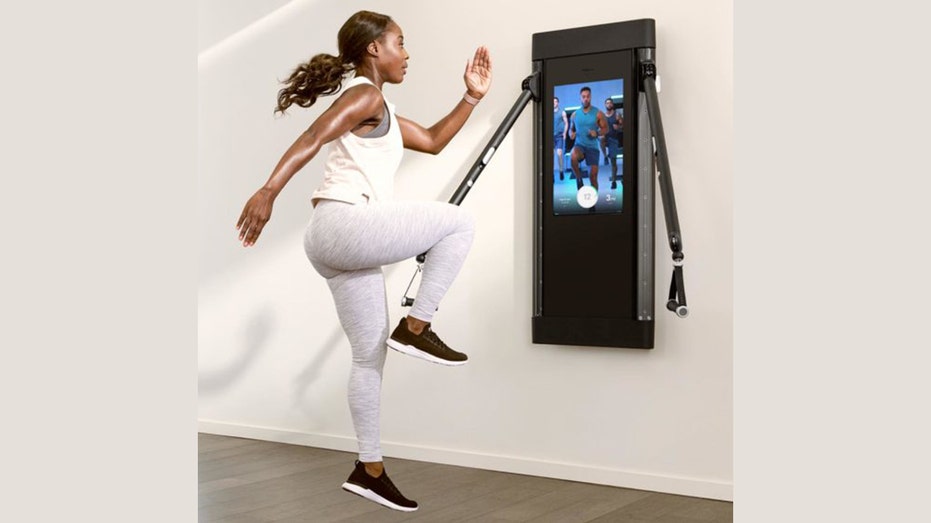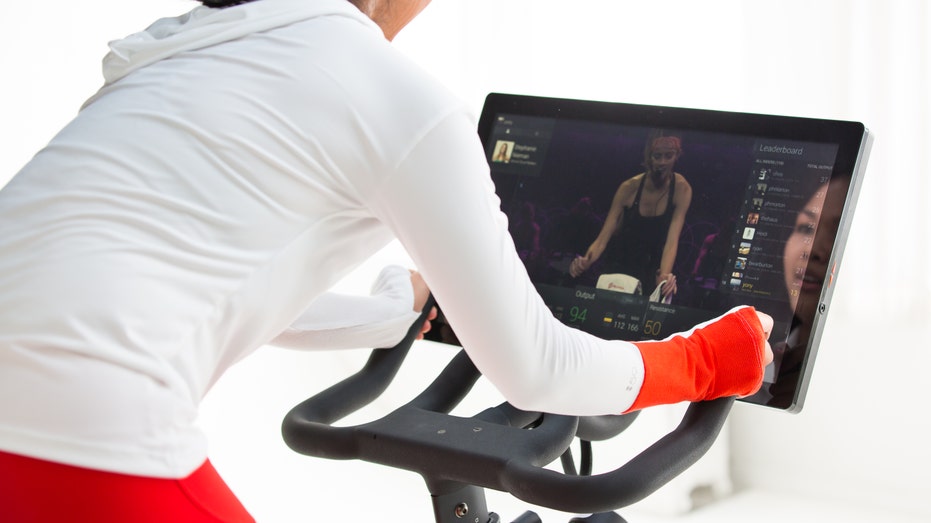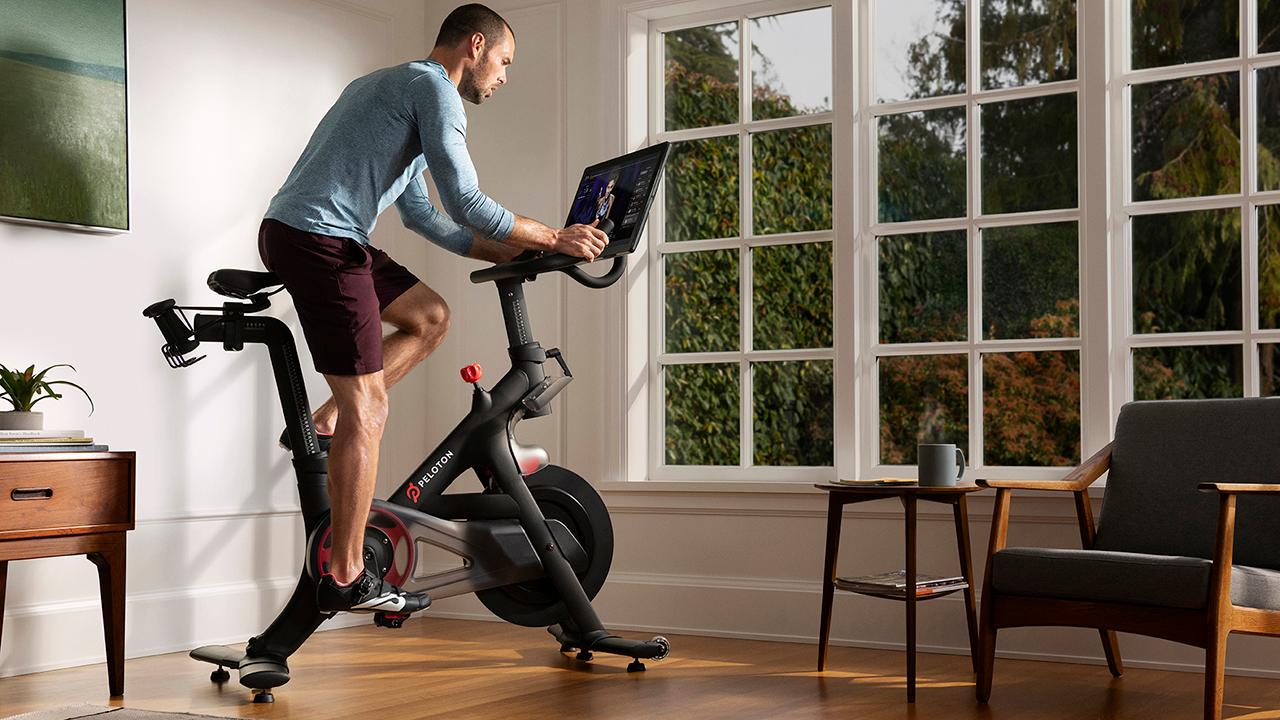Fitness wars: 'Peloton' of weightlifting enters at-home gym market
Workout costs $2,995 for the machine plus a $49 monthly subscription
Digital weight training has arrived.
Tonal, a strength training machine that hangs on your wall like a flight screen TV, lets users weight train with up to 200 pounds of resistance without picking up a single metal weight. It’s the latest at-home fitness brand competing in the $2 billion exercise equipment market against the likes of Peloton and Mirror.

Tonal, an at-home fitness machine, focuses on strength training with up to 200-pound weights of resistance minus the metal weights. (Courtesy of Tonal).
PELOTON COMMERCIAL'S HUSBAND: I DON'T SEE THE SEXISM
The at-home workout program mimics the in-person gym experience of weight lifting with a personal trainer who calls out reps on-screen and counts every single one users do, holding them accountable from their home living room. Trainees get coached on exactly how to work through the movements using a weighted TRX suspension training-like resistance pulley.
The startup has attracted big-name investors, announcing a $45 million round of funding last year led by celebrities like all-star tennis champion Serena Williams' Serena Ventures, bringing its total fundraising to $90 million. The workout costs $2,995 for the machine and $49 a month for a subscription to access the exercise content.
CYCLING STUDIOS SWEAT COMPETITION FROM PELOTON AND HOME FITNESS PROGRAMS
Americans are prioritizing at-home workouts as fitness programs become increasingly digitized, with companies like Peloton and Mirror capturing the growing category. And those who work in the fitness industry say the convenience factor coupled with the experience of having your own personal trainer without leaving the house is what's incentivizing users to buy-in.
| Ticker | Security | Last | Change | Change % |
|---|---|---|---|---|
| PTON | PELOTON INTERACTIVE INC. | 4.50 | -0.12 | -2.70% |
AS PELOTON STRUGGLES, NEXT FITNESS UNICORN HAS ARRIVED
“The fitness industry changed a lot over the last year; with the onset of at-home workout services, they have mitigated the stress of having to sign up at the right time for those sought-after classes," John Ford, CEO of eGym North America, a digital fitness company, told FOX Business in December. "Consumers have more access to fitness programs than before."
One in five Americans still works out at a gym or fitness studio, according to a study from 2019.
CLICK HERE TO GET FOX BUSINESS ON THE GO
Market research firm Euromonitor International surveyed 15,301 participants this year, asking them which types of exercise they typically do and found that 36 percent said they work out at home, while 13 percent said they do a group fitness class. Fifty-three percent, meanwhile, said walking and hiking were the No. 1 exercise. And Tonal seems to tap into the demand for outdoor workouts with seasonal programs to prep users for hiking and skiing.
5 FITNESS APPS CHEAPER THAN A GYM MEMBERSHIP
Streaming weight-lifting workouts is the next iteration of the home fitness trend. A new survey of roughly 1.7 million U.S. adults by the University of Southern Queensland Physically Active Lifestyles research group found that those who participated in either strength training or aerobic exercise were able to lower obesity or the likelihood of becoming obese.
Tonal, the San Francisco-based startup, which calls itself "the world's most intelligent home gym and personal trainer," joins a slew of other digital fitness equipment brands. Peloton, the unicorn fitness company known for its stationary bikes and treadmills which costs between $2,245 and $4,295 (not including subscription membership to workout content on the app), has more than 500,000 paid fitness users internationally. The company, which lets users stream thousands of cycling and running classes from the comfort of their own homes, went public last year. It’s slated to earn $1.45 billion to $1.5 billion by the end of the year.

Peloton is slated to earn up to $1.5 billion by the end of the year. (Peloton).
Like Peloton, Mirror, an interactive fitness tech-startup which launched in 2018 with an LCD mirror that lets users stream live and on-demand fitness classes at home. It secured $38 million in venture funding. The company has sold thousands of its devices across the country and rolled out personal training sessions for $40 each (the national average cost of a personal training session in person ranges from $40 to $70).
And Americans are willing to invest more in health and wellness. Sixty-one percent of people spend up to $175 per month and $2,100 a year, on exercise, according to a survey from ASweatLife.com, slightly under what it costs to purchase a piece of Peloton equipment.




















